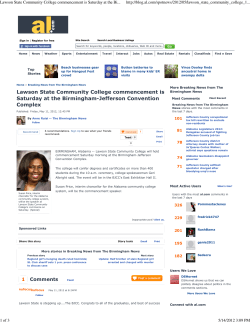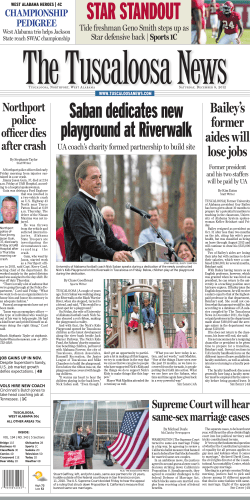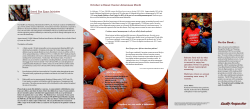
“A Witness to the Truth” rights activist,
winter 2002 “A Witness to the Truth” Martin Luther King Jr.’s Eulogy for PTS alum James J. Reeb Jimmy Lee Jackson, a 26-year-old African American civil rights activist, became the first martyr of the Selma, Alabama, campaign when a gunshot took his life. At his memorial service on February 26, 1965, the Southern Christian Leadership Conference announced that a march from Selma to Montgomery would begin on March 7. As the peaceful walk began, however, marchers faced brutal attacks from law officers. The Rev. Dr. Martin Luther King Jr. then Photo: PTS Archives urgently called for concerned clergy and citizens to join the efforts. The Reverend James J. Reeb, Princeton Seminary M.Div., Class of 1953, was one of those who responded to King’s call. Reeb was a compassionate and sensitive man with a searching soul. After leaving PTS, he had served as a Presbyterian chaplain in a hospital James J. Reeb in Philadelphia and then as an assistant pastor for a Unitarian Universalist church in Washington, D.C., before finding his place as a Quaker working with a lower-income housing project in Boston. Photo: Chrissie Knight His efforts in the voting rights campaign in Alabama had not even spanned one day when white assailants attacked him on a Selma sidewalk, fatally injuring him. Reeb died on March 11, 1965, and his death seemed, at least in part, to be the motivation for President Lyndon Johnson’s introduction of the Voting Rights Act to a joint session of Congress four days later. Although the President invited Plaque at the entrance to the Mackay Campus Center King to attend the event, King refused, opting instead to offer Reeb’s eulogy in Brown Chapel in Selma that day. An abridged version of King’s eulogy follows. It is an eloquent and profound tribute to Reeb. King’s words also speak to this moment in our nation’s history, when violence and justice, struggle and compassion, yet again beckon for our united attention. s in pire • 27 winter 2002 “A Witness to the Truth” by Martin Luther King Jr. And if he should die, Take his body, and cut it into little stars. He will make the face of heaven so fine That all the world will be in love with night. These beautiful words from Shakespeare’s Romeo and Juliet so eloquently describe the radiant life of James Reeb. He entered the stage of history just 38 years ago, and in the brief years that he was privileged to act on this mortal stage, he played his part exceedingly well. James Reeb was martyred in the Judeo-Christian faith that all men are brothers. His death was a result of a sensitive religious spirit. His crime was that he dared to live his faith; he placed himself alongside the disinherited black brethren of this community. The world is aroused over the murder of James Reeb. For he symbolizes the forces of good will in our nation. He demonstrated the conscience of the nation. He was an attorney for the defense of the innocent in the court of world opinion. He was a witness to the truth that men of different races and classes might live, eat, and work together as brothers. James Reeb could not be accused of being only concerned about justice for Negroes away from home. He and his family live in Roxbury, Massachusetts, a predominantly Negro community. [They] devoted their lives to aiding families in low-income housing areas. Again, we must ask the question: Why must good men die for doing good? “O Jerusalem, why did you murder the prophets and persecute those who come to preach your salvation?” So the Reverend James Reeb has something to say to all of us in his death. Naturally, we are compelled to ask the question, Who killed James Reeb? The answer is simple and rather limited, when we think of the who. He was murdered by a few sick, demented, and misguided men who have the strange notion that you express dissent through murder. There is another haunting, poignant, desperate question we are forced to ask this afternoon, that I asked a few days ago as we funeralized James Jackson. It is the question, What killed James Reeb? When we move from the who s 28 • in pire to the what, the blame is wide and the responsibility grows. ✵✵✵ James Reeb was murdered by the indifference of every minister of the gospel who has remained silent behind the safe security of stained glass windows. He was murdered by the irrelevancy of a church that will stand amid social evil and serve as a taillight rather than a headlight, an echo rather than a voice. He was murdered by the irresponsibility of every politician who has moved down the path of demagoguery, who has fed his constituents the stale bread of hatred and the spoiled meat of racism. He was murdered by the brutality of every sheriff and law enforcement agent who practices lawlessness in the “…every crisis has both its dangers and its opportunities, its valleys of salvation or doom in a dark, confused world.” name of law. He was murdered by the timidity of a federal government that can spend millions of dollars a day to keep troops in South Vietnam, yet cannot protect the lives of its own citizens seeking constitutional rights. Yes, he was even murdered by the cowardice of every Negro who tacitly accepts the evil system of segregation, who stands on the sidelines in the midst of a mighty struggle for justice. So in his death, James Reeb says something to each of us, black and white alike— says that we must substitute courage for caution, says to us that we must be concerned not merely about who murdered him, but about the system, the way of life, the philos- ophy which produced the murder. His death says to us that we must work passionately, unrelentingly, to make the American dream a reality, so he did not die in vain. God still has a way of bringing good out of evil. History has proven over and over again that unmerited suffering is redemptive. The innocent blood of this fine servant of God may well serve as the redemptive force that will bring new light to this dark state. This tragic death may lead our nation to substitute aristocracy of character for aristocracy of color. James Reeb may cause the whole citizenry of Alabama to transform the negative extremes of a dark past into the positive extremes of a bright future. Indeed, this tragic event may cause the white South to come to terms with its conscience. So in spite of the darkness of this hour, we must not despair. As preceding speakers have said so eloquently, we must not become bitter nor must we harbor the desire to retaliate with violence; we must not lose faith in our white brothers who happen to be misguided. Somehow we must still believe that the most misguided among them will learn to respect the dignity and worth of all human personalities.… One day the history of this great period of social change will be written in all of its completeness. On that bright day our nation will recognize its real heroes. They will be thousands of dedicated men and women with a noble sense of purpose that enables them to face fury and hostile mobs with the agonizing loneliness that characterizes the life of the pioneers. They will be faceless, anonymous, relentless young people, black and white, who have temporarily left behind the towers of learning to storm the barricades of violence. They will be old, oppressed, battered Negro women, symbolized in a 72year-old Negro woman in Montgomery, Alabama, who rose up with a sense of dignity, and with the people decided not to ride the segregated buses; who responded with ungrammatical profundity to one who inquired about her weariness, “My feets is tired, but my soul is rested.” They will be ministers of the gospel, priests, rabbis, and nuns, who are willing to march for freedom, to go to jail for conscience’ sake. One day the South will know from these dedicated children of God courageously protesting segregation, they were in reality standing up for the best in the American dream, standing up with the most sacred values in our JudeoChristian heritage, thereby carrying our winter 2002 whole nation back to those great wells of and its opportunities, its valleys of salvation lish a society where men will be—that “out democracy which were dug deep by the or doom in a dark, confused world. The of one blood God made all men to dwell Founding Fathers in the formulation of the kingdom of God may yet reign in the hearts upon the face of the earth.” We must work Constitution and the Declaration of of men. with determination for that great day. Independence. When this glorious story is I say, in conclusion, the greatest tribute “Justice will roll down like water, and rightwritten, the name of James Reeb will stand that we can pay to James Reeb this afternoon eousness like a mighty stream.” We must as a shining example of manhood at its best. is to continue the work he so nobly started work right here, where “every valley shall be ✵✵✵ but could not finish because his life—like exalted, every mountain and hill shall be So I can say to you this afternoon, my the Schubert “Unfinished Symphony”—was made low, the rough places will be made friends, that in spite of the tensions and cut off at an early age. We have the challenge plain, and the crooked places straight. The uncertainties of this period, something and charge to continue. We must work right glory of the Lord shall be revealed, and all profoundly meaningful is taking place. Old here in Alabama, and all over the United flesh shall see it together.” We must work to systems of exploitation and oppression are States, till men everywhere will respect the make the Declaration of Independence real passing away. Out of the wombs of a frail dignity and worth of human personalities. in our everyday lives. world, new systems of justice and equality We must work with all our hearts to estabIf we will do this, we will be able—right are being born. Doors of here in Alabama, right opportunity are gradually here in the deep South, being opened. Those at right here in the United the bottom of society, States—to transform the shirtless and barefoot peojangling discords of our ple of the land, are develnation into a beautiful oping a new sense of symphony of brotherby William O. Harris somebody-ness, carving hood. We will be able to At this tragic a tunnel of hope through speed up the day when all time it is helpful to the dark mountain of of God’s children—as remember the many Princeton despair. “People who expressed so beautifully in Seminary gradustand in darkness have this marvelous ecumenical ates who have seen a great light.” Here service—all of God’s given their lives and there an individual children, black men and for the love of Jesus in fulfilment or group dares to love white men, Jews and of his command and rises to the majestic Gentiles, Protestants and to love one anothheights of moral maturity. Catholics, will be able to er. There are sevTherefore I am not join hands in unity and eral plaques on the porch of the yet discouraged about brotherhood to bring Mackay Campus the future. Granted, the about the bright day of Center that remind easygoing optimism of the brotherhood of man us of PrincetoniPlaque at the entrance to the Mackay Campus Center yesteryear is impossible. under the guidance of the ans who have laid down their lives in Granted, that those who fatherhood of God. the service of the pioneered in the struggle So we thank God for kingdom of Christ. One of these plaques contains the names of six missionary for peace and freedom the life of James Reeb. We alumni and their wives: Walter Lowrie (Class of 1840) and his wife were thrown will still face uncomfortthank God for his goodinto the China Sea in 1847; John Freeman (Class of 1838) and Robert McMullin (Class of 1853) and their wives were shot in 1857 during a mutiny in India; able jail terms and painful ness. We thank God that Isidor Loewenthal (Class of 1854), a convert from Judaism, was killed in India threats of death; they he was willing to lay in 1864; William E. McChesney (Class of 1869) was killed by pirates in China in will still be battered by down his life in order to 1872; and John R. Peale (Class of 1905) was killed with his wife in China during the Boxer Rebellion. Another plaque remembers Elijah Lovejoy (Class of 1834), the storms of persecution, redeem the soul of our who was killed in 1837 by a mob in Illinois for preaching and publishing a leading them to the nation. So I say—so newspaper advocating the abolition of slavery. A third plaque honors James nagging feeling that they Horatio said as he stood Reeb (Class of 1953), who was beaten to death in 1965 while marching with can no longer bear such over the dead body of Martin Luther King Jr. for civil rights in Selma, Alabama. A plaque, currently being restored, recalls William Shedd (Class of 1892), who died of disease in a heavy burden; the Hamlet—“Good night 1918 in Persia while leading a company of Armenian Christians escaping persetemptation of wanting sweet prince: may the cution He was hastily buried under rocks while his wife prayed the Lord’s to retreat to a more quiet flight of angels take thee Prayer as the group continued its flight. and serene life. Granted, to thy eternal rest.” ❚ Countless others, including more than 300 Korean Presbyterian pastors in the that we face a world cri1950s, have suffered violent deaths and gained the Victor’s Crown because of a License granted by sis, which leaves us standfaith taught them by Princetonians. “They being dead yet speak.” Hebrews 11:4 Intellectual Properties ing so often amid the Management, Atlanta, surging murmur of life’s William O. Harris is Princeton Seminary’s librarian for archives and special collections. Georgia, as exclusive licenrestless seas. But every sor of the King Estate. crisis has both its dangers Photo: Beth Godfrey Given in Love s in pire • 29
© Copyright 2026










